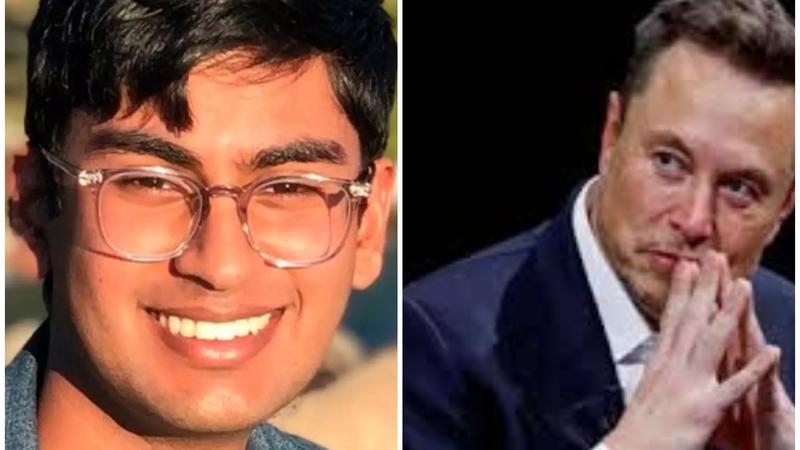Published 08:55 IST, January 14th 2025
‘Thank You, Elon Musk': Suchir Balaji’s Mother Believes 'X' Will Reveal Truth Behind Son's Death
In a video post, Poornima said, "@elonmusk thank you for your attention to this.

New Delhi: As the mystery surrounding the death of Suchir Balaji deepens, the case which reignited critical discussions about the ethics and transparency of artificial intelligence development, his mother Poornima Rao thanked billionaire Elon Musk and his social media company X saying, "@elonmusk thank you for your attention to this."
In a video post, Poornima said, "@elonmusk thank you for your attention to this. Thank you for the X platform where we can express facts concerns openly with out fear of being killed."
Balaji, a former OpenAI programmer and whistleblower, was found dead in his San Francisco residence last year. He had been an open critic of OpenAI’s transition to a for-profit model, raising concerns about the ethical risks of generative AI and potential copyright violations. These concerns have sparked a wider debate within the tech industry and beyond.
Not Suicide, a Cold-Blooded Murder: Suchir Balaji's Mother
Suchir Balaji's death reignited concerns about the ethics and transparency in artificial intelligence development. Balaji, who was found deceased in his San Francisco home last year, was an outspoken critic of OpenAI's shift to a for-profit model.
While initially his death was termed as a suicide, his family and some investigative journalists believe it to be a murder. Suchir Balaji's mother, Poornima Rao, in a recent interview, claimed that her son was not okay with OpenAI becoming ‘for-profit’. She earlier claimed her son's death to be a ‘cold-blooded murder declared by authorities as suicide’.
Poornima said, "The reason he joined OpenAI was his belief that AI will help humanity. He was very impressed with OpenAI initially because they were nonprofit. That's when his concern started to arise, and he started questioning himself.”
As the case came in the limelight, high-profile figures such as Elon Musk, questioned the circumstances of his death, challenging the police’s ruling of suicide and calling for a more thorough investigation.
Billionaire entrepreneur Elon Musk has responded to the plea made by the mother of OpenAi Whistleblower Suchir Balaji saying, “This doesn't seems a suicide”, in which she called for an FBI investigation following her son's death. Balaji accused the AI giant of copyright violations, and he was found dead a month after the allegations surfaced.
Who was Suchir Balaji?
Suchir Balaji, a 26-year-old Indian-American tech researcher who openly criticized the use of copyrighted data in artificial intelligence (AI), was found dead in his San Francisco apartment. He joined OpenAI in 2019 and during his four years at the company, he worked on several projects, including GPT-4 training and improving ChatGPT’s performance. He left OpenAI in August this year, expressing concerns over the potential harm OpenAI could cause. During his tenure, he played a significant role in data collection for OpenAI's flagship product, ChatGPT.
On his website, Balaji elaborated on his concerns, claiming that OpenAI's method of copying data for training its models potentially amounted to copyright infringement. He touched on issues like the ethical risks of generative AI and potential copyright violations, which have ignited a broader debate within the tech industry and beyond.
Just a day before his death, Balaji’s name was mentioned in a copyright lawsuit against OpenAI. Though details about his involvement remain unclear, his public criticism of the company’s data usage practices likely drew attention to his stance on ethical AI development. Suchir Balaji had accused OpenAI of training its AI models on copyrighted material scraped from the internet without proper authorization, a practice he argued was detrimental. "If you believe what I believe, you have to just leave the company," Balaji said in an interview with The New York Times earlier this year. The Indian-origin tech professional resigned from OpenAI in October 2023 after nearly four years with the company.
Balaji was outspoken about what he called OpenAI’s misuse of copyrighted materials to train generative AI models. In October, he posted on X (formerly Twitter), “Fair use seems like a pretty implausible defense for a lot of generative AI products, for the basic reason that they can create substitutes that compete with the data they’re trained on.” He also criticized the company’s reliance on ‘fair use’ as a defense, arguing in a blog post cited by the Chicago Tribune that the training of AI systems like ChatGPT raised significant legal and ethical concerns. “No known factors seem to weigh in favor of ChatGPT being a fair use of its training data,” he wrote.
Updated 11:55 IST, January 14th 2025




